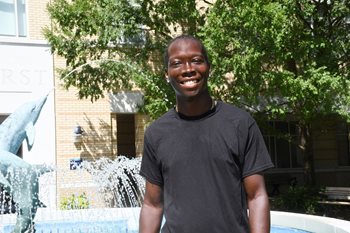
Marc-keys Moore.
Marc-keys Moore of Salisbury was still a newborn when he was diagnosed with sickle cell disease (SCD). The blood disorder causes misshapen red blood cells, resulting in complications such as severe pain, a heightened risk of blood clots and stroke, kidney disease and many other health problems.
Moore, now 25, recently became one of the first people in the nation to be considered cured from SCD. He will talk about his experiences during three Thursday symposiums at Wor-Wic Community College on Sept. 15, 22 and 29 at 5 p.m. each day. His journey to the stage was a difficult one.
“Quite literally, everything was a challenge,” Moore said. “As a kid, I had to stay in and watch kids play outside in the summer and winter because I couldn’t tolerate temperature extremes. I couldn’t travel because high elevations could cause a crisis.”
Sickle cell crises cause intense pain and can last from minutes to days. Moore’s mother worked at keeping him healthy, but that proved to be a full-time job.
“A lot of people think sickle cell just affects the person, but it affects the whole family,” he said. “My mom was a single parent and had to wake up at 3 a.m. to take me to the hospital sometimes. I had to have regular appointments at the University of Maryland Medical Center. I know it was hard.”
Moore graduated from Wor-Wic in 2020 with an associate degree in business management. Calculus class brought him more than math skills – he met his wife there. Last year, they were even able to have a baby, something that SCD also can make more difficult. In addition to medical barriers, there’s the fact that SCD can be genetic. Fortunately, Moore’s wife is not a carrier and their baby is healthy.
Having his own family helped motivate Moore to keep his disease in check, but the median life expectancy for men with SCD is around 42 years. “I enrolled in a clinical trial at the National Institutes of Health two years ago,” he said. Unfortunately, the trial was discontinued, but he was able to find another being conducted at Johns Hopkins Medicine in Baltimore. The sickle cell transplant program at the Johns Hopkins Kimmel Cancer Center changed Moore’s life.
The treatment required Moore to withstand chemotherapy and full-body radiation to eradicate his own bone marrow, which would be replaced by marrow from a healthy donor. This can be a barrier, as perfectly matched donors can be difficult to find, but the study allowed a half-match – and Moore’s cousin was able to step up and donated.
The decision to undertake the grueling treatment in March was not difficult for Moore. “When I got there, I was in horrible shape,” he said. “My body was in terrible pain; I couldn’t walk and had to take pain medication every six hours.” His wife’s grandparents laid down a mattress in their van to try to minimize his discomfort on the drive to Hopkins.
Moore was fortunate to be in the care of a world-renowned expert: Dr. Robert Brodsky, who helped pioneer the procedure and is the president-elect of the American Society of Hematology. Brodsky will attend and speak at one of the symposiums along with some of Moore’s other providers.
Moore was in the hospital for over a month going through the preparation and transplant, and then rebuilding his vulnerable immune system as much as possible. The procedure was a success.
“Now I feel absolutely amazing,” Moore said. “It was like I had lived in the shade my whole life, and now I can step into the light.” He is living a pain-free life in which he no longer needs to fear a pain crisis provoked by something as simple as walking into an air-conditioned building on a hot day. He is able to keep up with his one-year-old son and work. But he has some evenings reserved for a cause.
“After having this experience, I truly want to help people,” he said “People need to know more about this disease, what it can do and that it can even be cured now.”
To learn more about SCD and transplantation, visit the events section of worwic.edu to sign up for the Sickle Cell symposium, which is free and will take place on the college campus at the corner of Route 50 and Walston Switch Road in Salisbury.
If you go